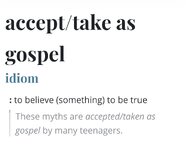I’m not sure what dictionary you've read, or school you went to, but the word gospel has no inference or implication of dishonesty. In this context, you would use the definition, “a thing that is absolutely true”. When I say there is a problematic lack of context to the gospel, it means some here are so confined to the black and white results of an unrealistic internet test that they are unwilling to reflect on whether it even applies to THEM. If the reader’s rifle will never see any of those conditions that caused ONE sample to fail, as most won’t, the results are academic and don’t apply in their context. From an experimental design perspective, the field tests have massive issues, which Form himself acknowledges at times. Some people will read that as a dig, but it’s not. It’s a factual statement some of us nerds will understand. The existence of so much contrary evidence to some of the results draws even more question to their validity across the product as a whole. But, that’s the nature of the beast. I still used his results to drive a buying decision on a Credo HX. I wouldn’t have bought an optically mediocre scope if I didn’t see value in his work.Not sure I understand the gospel statement. Using that term infers dishonesty, which I don’t see. I see a field test that tries to minimize sources of error and subjectivity. Any additional context is created by the reader. The results help me interpret some of the scope failures I’ve seen and experienced. I don’t see a cabal of conspiracy in this. I don’t even think the companies are making bad products on purpose. I don’t think they know any better. But like most people who are presented with evidence that is contrary to their beliefs, the first response is denial and defensiveness. Some will stop at that point, while others will use that evidence to evaluate their beliefs and adapt.
And no offense, but like I said we differ on the importance of high-quality glass in scopes. I see the glass as an aesthetic feature that is not required with respect to hunting. The issue is that it’s become the primary feature for many manufacturers, and the mechanical performance has suffered.
If you believe optical and mechanical engineers “don’t know any better”, and are designing poor performance because of ignorance, I would encourage you to never get in another automobile. They design equipment with a low failure threshold because a finance team gave them a max unit production cost, and marketing gave them a minimum feature list that is unattainable within that budget. I’m a project accountant, that is LITERALLY my job. Your last sentence makes your position even more confusing because you state that manufactures are designing specifically for optical performance and not for mechanical performance. How could they make that design decision if they didn’t know any better?
Not sure what denial tangent is about?
You see glass as an aesthetic feature. Again, I’m not sure of your definition of that word, but I described it as exactly that. We’re not differing on anything? I literally said, “it’s never been a question of will this scope get me to legal”. It’s about the experience. If I’ve got multiple optics that would be reliable in my use case, I’m buying the one that lets me hunt in 4K UHD.
I know some of this post will likely read offensive or as taking shots, but it’s in no way intended to. I’m just trying to understand and clarify the positions.


